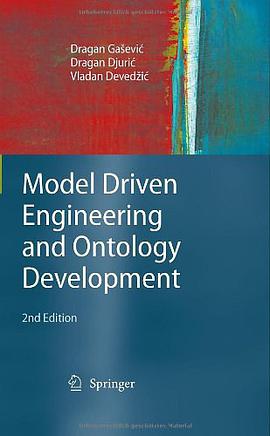

具体描述
Defining a formal domain ontology is generally considered a useful, not to say necessary step in almost every software project. This is because software deals with ideas rather than with self-evident physical artefacts. However, this development step is hardly ever done, as ontologies rely on well-defined and semantically powerful AI concepts such as description logics or rule-based systems, and most software engineers are largely unfamiliar with these. GaAevic and his co-authors try to fill this gap by covering the subject of MDA application for ontology development on the Semantic Web. Part I of their book describes existing technologies, tools, and standards like XML, RDF, OWL, MDA, and UML. Part II presents the first detailed description of OMGa (TM)s new ODM (Ontology Definition Metamodel) initiative, a specification which is expected to be in the form of an OMG language like UML. Finally, Part III is dedicated to applications and practical aspects of developing ontologies using MDA-based languages. The book is supported by a website showing many ontologies, UML and other MDA-based models, and the transformations between them. "The book is equally suited to those who merely want to be informed of the relevant technological landscape, to practitioners dealing with concrete problems, and to researchers seeking pointers to potentially fruitful areas of research. The writing is technical yet clear and accessible, illustrated throughout with useful and easily digestible examples." from the Foreword by Bran Selic, IBM Rational Software, Canada. "I do not know another book that offers such a high quality insight into UML and ontologies." Steffen Staab, U Koblenz, Germany
作者简介
目录信息
读后感
评分
评分
评分
评分
用户评价
偶然间翻到《Model Driven Engineering and Ontology Development》这本书,里面的内容真的让我眼前一亮。作为一个多年从事软件开发的人,我一直觉得模型驱动工程(MDE)是个很有前景的方向,但总感觉在语义的表达和智能化处理上有些欠缺。这本书恰恰弥补了我的这种感觉。作者巧妙地将本体论(Ontology)这个概念引入MDE,让我看到了一个全新的解决思路。我一直觉得,模型如果能像人类一样理解事物之间的关系和含义,那它的作用将大大提升。书中详细地解释了本体论如何为模型赋予“意义”,比如如何用本体来描述软件系统中的各种概念、属性以及它们之间的关系。这不仅仅是形式化的定义,更是对系统知识的深刻建模。我特别喜欢书中关于如何构建和应用本体来驱动模型生成的章节,感觉像是给MDE插上了智能的翅膀。以前觉得MDE主要就是代码生成,现在才意识到,它还可以通过本体来做更深层次的分析和推理,甚至可以实现不同模型之间的无缝集成。这本书让我对MDE的理解进入了一个新的层次,也让我对未来软件开发的智能化充满了信心。
评分最近有机会翻阅了《Model Driven Engineering and Ontology Development》一书,作为一名长期在软件开发一线摸爬滚打的工程师,我对书中提出的“以模型为中心”的开发范式,特别是将本体论(Ontology)引入到模型驱动工程(MDE)中的思路,感到尤为兴奋。以往我们在开发过程中,模型往往停留在UML等形式化描述阶段,其语义的表达能力有限,导致模型之间的互操作性和智能化处理存在瓶颈。而这本书则提供了一个全新的视角,它将本体论中丰富的语义表达能力赋予了模型,使得模型不再仅仅是静态的结构图,而是能够承载更深层次的意义和推理能力。作者在书中细致地讲解了如何利用本体来定义和约束模型元素,如何通过本体来促进不同模型之间的集成和转换,以及如何利用本体驱动代码生成,极大地提升了软件开发的自动化和智能化水平。书中对本体构建方法论的阐述,以及如何将其与MDE工具链进行整合的实践案例,都给我留下了深刻的印象。它不仅仅是一本理论书籍,更是一本能够指导实际操作的宝典,让我看到了解决软件开发中一些长期存在的痛点问题的希望。
评分我一直在寻找一本能够系统性梳理模型驱动工程(MDE)与本体论(Ontology)之间关系的书籍,而《Model Driven Engineering and Ontology Development》恰好满足了我的需求。本书作者以一种严谨而富有洞察力的视角,将这两个看似独立的领域巧妙地融为一体,构建了一个强大的理论框架。从我个人的理解来看,MDE的核心在于抽象和自动化,而本体论则提供了实现这些目标的语义基础。书中对MDE的介绍,不仅仅停留在工具的罗列,而是深入探讨了其背后的设计哲学和演进过程,让我能够更深刻地理解MDE为何能够解决软件开发中的复杂性问题。更令我赞叹的是,作者在本书中详细阐述了本体论在MDE中的关键作用,例如如何通过本体来定义领域知识,如何利用本体来描述模型的语义,以及如何通过本体驱动代码生成等。这些内容让我看到了MDE的巨大潜力,尤其是在需要处理复杂、异构系统,或者需要进行知识推理和自动化决策的场景下,本体驱动的MDE将能够发挥至关重要的作用。本书的论证逻辑严密,案例分析也十分丰富,为我提供了宝贵的理论指导和实践启示。
评分作为一名对软件工程理论研究抱有浓厚兴趣的学者,我近期有幸研读了《Model Driven Engineering and Ontology Development》一书。本书的创新之处在于,它将模型驱动工程(MDE)这一强大的软件开发范式,与本体论(Ontology)这一人工智能领域的核心概念紧密结合。在此之前,MDE的研究主要集中在如何通过高级抽象模型来生成代码,而本体论的应用则更多地体现在知识表示和推理方面。这本书打破了这种界限,它深刻地揭示了本体论如何为MDE提供坚实的语义支撑,使得模型不仅仅是形式化的表达,更能够具备丰富的语义内涵,从而实现更高级别的自动化和智能化。作者在书中对MDE的最新进展进行了梳理,并详细阐述了本体论在各个环节中的具体应用,例如本体驱动的元模型设计,本体驱动的模型转换,以及如何利用本体来增强模型的查询和推理能力。这些内容对于推动MDE理论的进一步发展,以及探索其在人工智能、大数据等前沿领域的应用,都具有重要的理论和实践意义。
评分我最近读了一本叫做《Model Driven Engineering and Ontology Development》的书,虽然我不是这个领域的专家,但这本书给我留下了深刻的印象。书的开篇就以一种非常宏观的视角,阐述了模型驱动工程(MDE)的理念是如何在软件开发领域掀起一场革命的。作者不仅仅是罗列MDE的各种工具和技术,更是深入浅出地剖析了其核心思想:通过抽象和模型来简化复杂性,从而提高开发效率和软件质量。从一个初学者的角度来看,书中的逻辑清晰,循序渐进,让我能够逐步理解MDE是如何从概念走向实践的。尤其是对于本体(Ontology)的介绍,作者并没有将其处理成一个独立的、晦涩的概念,而是巧妙地将其融入MDE的框架之中,解释了本体是如何为模型提供语义支持,使得模型能够被更智能地处理和理解。这一点让我茅塞顿开,原来模型不仅仅是结构的蓝图,更可以承载丰富的含义。书中对不同建模语言的比较分析也十分到位,让我了解了不同语言的优劣以及适用场景,这对于我未来选择合适的工具来构建自己的模型系统非常有帮助。虽然书中一些高级概念需要反复咀嚼,但整体而言,这本书为我打开了一扇通往更高效、更智能软件开发世界的大门,让我对未来的技术发展充满了期待。
评分 评分 评分 评分 评分相关图书
本站所有内容均为互联网搜索引擎提供的公开搜索信息,本站不存储任何数据与内容,任何内容与数据均与本站无关,如有需要请联系相关搜索引擎包括但不限于百度,google,bing,sogou 等
© 2026 book.wenda123.org All Rights Reserved. 图书目录大全 版权所有




















